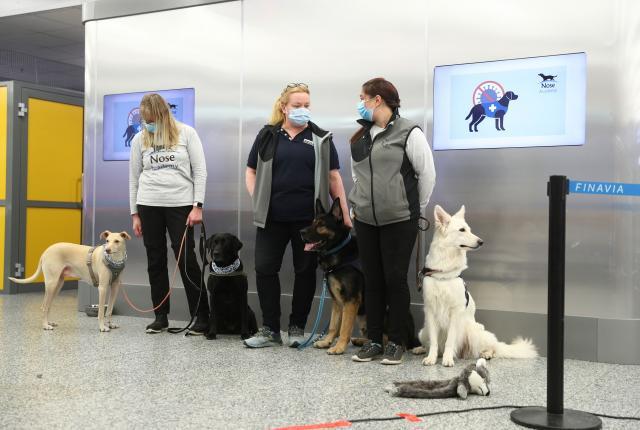The Finnish Kennel Club has given Special Hero Dog Awards to COVID-19 sniffer dogs Kössi, Miina, E.T and Valo


Every year, the Finnish Kennel Club gives Hero Dog Awards to dogs that have helped save one or more human lives. This year, in addition to the other Hero Dog Awards, the Finnish Kennel Club will also give Special Hero Dog Awards to the four COVID-19 sniffer dogs Kössi, Miina, E.T and Valo, who work at Helsinki Airport and have been trained by Wise Nose – Finland’s Smell Detection Association.
“These four dogs are Hero Dogs in a league of their own. With their work, they have had a positive effect on people’s well-being around the world. These dogs also highlight the importance of dogs in society – nothing could replace our four-legged friends,” says Harri Lehkonen, the Chair of the Finnish Kennel Club's Board.
Studies by Anna Hielm-Björkman, Adjunct Professor of clinical research on companion animals, have found that dogs can detect COVID-19 quickly and even more reliably than laboratory tests. Based on these preliminary results, the four COVID-19 sniffer dogs will be working at Helsinki Airport until the end of this year to test passengers arriving in Finland for COVID-19 using skin swab samples.
“At the beginning of the COVID-19 epidemic, we wondered if dogs would be able to identify people who have COVID-19. Using samples from people we know, we tested if Kössi was able to detect the smell of COVID-19, and it turned out Kössi could do it. We first started a research project and then COVID-19 sniffer dog training and the pilot scheme at Helsinki Airport to screen passengers for COVID-19,” says Susanna Paavilainen, the Executive Director of Wise Nose and the handler of galgo cross Kössi and Labrador retriever Miina.
According to Paavilainen, COVID-19 sniffer dogs have been received at the airport with positivity and joy. Passengers and airport staff recognise the dogs and come to say hello. The COVID-19 sniffer dogs make many people’s day better.
“I especially remember the time E.T indicated the first positive sample from passenger samples. I was proud of the dog and its work,” says Anette Kare, the handler of the white Swiss shepherd dog E.T.
Kare and E.T. were part of Wise Nose’s cancer detection dog group when the COVID-19 epidemic began. From that starting point, it was easy to join the COVID-19 sniffer dog training, which Kare found very motivating.
The German shepherd Valo has also done cancer detection work before joining the COVID-19 sniffer dog activities. Valo sniffs samples at the dog school because it is too big to work at the airport’s scent station. However, Valo still visits the airport to practise, says Valo’s handler Heli Niuro.
“The dogs have been received with great enthusiasm at the airport. Even though Valo is a big dog, people are not afraid come up to us, and Valo has been very excited to have so many admirers. I personally feel that doing research, meaning comparing dogs’ ability to detect COVID-19 to the PCR test, makes this even more interesting!”
Many people have asked if they could train their own dog to be COVID-19 sniffer dog. COVID-19 sniffer dog work is not a hobby. Instead, it requires a full-time commitment, the dog handlers say. The training may also be stopped if the dog does not have the required qualities for scent work or for working in various environments.
Susanna Paavilainen hopes that more places in COVID-19 sniffer dog training will become available in the future. The activities are constantly being developed, and COVID-19 sniffer dogs have already turned out to be very important. In the future, there could be many uses for COVID-19 sniffer dogs.
For further information, please contact:
Chair of the Finnish Kennel Club’s Board
Harri Lehkonen
harri.lehkonen@kennelliitto.fiTel. +358 (0)50 329 2188
Executive Director of Wise Nose
Susanna Paavilainen
susanna.paavilainen@wisenose.fi
Tel. +358 (0)44 504 4464
Pictures: Jukka Pätynen/koirakuvat.fi